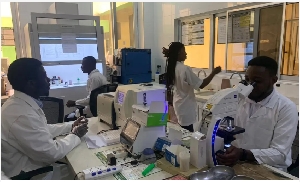 Researchers at the Centre are currently conducting trials on the product
Researchers at the Centre are currently conducting trials on the product
The Centre for Plant Medicine Research – Mampong Akuapem (CPMR) is developing herbal anti-snake venom as a natural remedy to save the lives of people who are bitten by snakes.
Researchers at the Centre are currently conducting trials on the product, which is about 80-90 per cent complete.
Mr. Kwadwo Asare Agyei, Head, Public Relations and Marketing, CPMR, said researchers are “seriously” working on the product to ensure its efficiency.
He said the Centre was hopeful that the Government would adopt the product when it was ready to help stem deaths associated with snakebites and address the repeated shortage of anti-snake venom.
“We don’t joke with standardization. So, we want to make it a policy that whenever we are through (standardization) with this particular venom, Government will come on board, probably adopt the product and give it to the Ghanaian populace,” Mr. Agyei said.
The World Health Organisation has considered snakebite as a neglected tropical disease that plagued rural communities.
The supply of anti-snake venom to health facilities particularly those in rural communities has not been regular over the years.
To make up for the shortage, some rural folks resort to local remedies, including ‘black stone’ which many believe sucks the venom from a reptile bite when placed on the wound.
In 2019 for instance, Kwahu Afram Plains, a town in the in the Eastern Region recorded an increment in deaths from snakebites due to what medical officers described as delay in reporting the cases to hospitals after resorting to the use of local concoctions.
The Presbyterian Hospital at Donkorkrom in the Kwahu Afram Plains North recorded five mortality cases from snakebites as against two in 2018, making snakebites the third cause of death at the Hospital as compared to 2018 when it was ranked 10th.
Mr. Agyei said the CPMR was constantly researching into emerging challenge to guide the development of efficient plant-based medicines.
He said the acceptability of herbal medicine improved after the COVID-19 pandemic, but called for continuous education and sensitisation to clear misconceptions about the use of herbal medicines.
“We have not lost focus on some of our products which have been taken to Noguchi to work on to see how effective we can work on the COVID-19; we are about 75-80 per cent through. It has proven to be very successful,” he said.
In 2021, the CPMR was adjudged the outstanding research and development Company (Herbal Medicine) at the Ghana Business Standard Awards for its diligence and work output.
The Centre also won the Herbal Company of the Year at the Ghana Pharma Awards the same year.
Mr. Agyei appealed to manufacturers of herbal products to submit their products to the Centre for quality testing to meet regulatory standards and ensure the safety of consumers.
“We are going to assist them (manufacturers) to run the necessary tests to secure their certificate. Acquiring the certificates will boost the public’s confidence in the products they are taking,” he said.